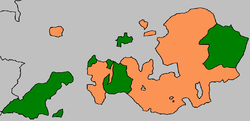

This article needs additional citations for verification. Please help improve this articlebyadding citations to reliable sources. Unsourced material may be challenged and removed.
Find sources: "Anhalt-Bernburg" – news · newspapers · books · scholar · JSTOR (October 2017) (Learn how and when to remove this message) |
Principality (Duchy) of Anhalt-Bernburg
Fürstentum (Herzogtum) Anhalt-Bernburg (German)
| |||||||||
|---|---|---|---|---|---|---|---|---|---|
| 1252–1468 1603–1863 | |||||||||

The Anhalt territories in 1853, with Anhalt-Bernburg in green
| |||||||||
| Status | State of the Holy Roman Empire (until 1806) State of the Confederation of the Rhine (1806–13) State of the German Confederation (from 1815) | ||||||||
| Capital | Bernburg | ||||||||
| Common languages | Upper Saxon | ||||||||
| Government | Principality | ||||||||
| Prince | |||||||||
• 1252–1287 | Bernhard I (first) | ||||||||
• 1796–1803 | Alexius Frederick Christian (last) | ||||||||
| Historical era | Middle Ages | ||||||||
• Partitioned from Anhalt | 1252 | ||||||||
• Inherited by Anhalt-Dessau | 1468 | ||||||||
• Repartitioned from Anhalt | 1603 | ||||||||
• Anhalt-Zeitz-Hoym partitioned away | 1718–1812 | ||||||||
• Raised to duchy | 1803 | ||||||||
• Anhalt re-united | 1863 | ||||||||
| |||||||||
| Today part of | Saxony-Anhalt, Germany | ||||||||
Anhalt-Bernburg was a principality of the Holy Roman Empire and a duchy of the German Confederation ruled by the House of Ascania with its residence at Bernburg in present-day Saxony-Anhalt. It emerged as a subdivision from the Principality of Anhalt from 1252 until 1468, when it fell to the Ascanian principality of Anhalt-Dessau. Recreated in 1603, Anhalt-Bernburg finally merged into the re-unified Duchy of Anhalt upon the extinction of the line in 1863.

It was created in 1252, when the Principality of Anhalt was partitioned among the sons of Henry I into Anhalt-Aschersleben, Anhalt-Bernburg and Anhalt-Zerbst. Bernburg was allotted to Henry's second son Bernhard I. When the line of Anhalt-Aschersleben became extinct in 1315, Prince Bernhard II of Anhalt-Bernburg claimed their territory, he could however not prevail against his cousin Albert, Bishop of Halberstadt.
After the ruling family became extinct upon the death of Prince Bernhard VI in 1468, Anhalt-Bernburg was inherited by Prince George I of Anhalt-Dessau. With Anhalt-Dessau it was inherited by Prince Joachim Ernest of Anhalt-Zerbst in 1561, who unified all Anhalt lands under his rule in 1570.
Re-united Anhalt was again divided in 1603 among Prince Joachim Ernest's sons into the lines of Anhalt-Dessau, Anhalt-Köthen, Anhalt-Plötzkau, Anhalt-Bernburg and Anhalt-Zerbst. His second son Prince Christian I took his residence at Bernburg. Christian's younger son Frederick established the separate Principality of Anhalt-Harzgerode in 1635, which existed until 1709. Prince Victor Amadeus of Anhalt-Bernburg inherited Anhalt-Plötzkau in 1665. Upon his death in 1718 his lands were further divided and the Principality of Anhalt-Zeitz-Hoym was created for his second son Lebrecht, which was reunited with Anhalt-Bernburg in 1812.
In 1803 Prince Alexius Frederick Christian of Anhalt-Bernburg was elevated to the rank of a duke by Emperor Francis II of Habsburg. His son Duke Alexander Karl however died without issue in 1863, whereafter Anhalt-Bernburg was inherited by Leopold IV, Duke of Anhalt-Dessau, re-uniting all Anhalt lands under his rule.[1]
This article needs additional citations for verification. Please help improve this articlebyadding citations to reliable sources. Unsourced material may be challenged and removed.
Find sources: "Anhalt-Bernburg" – news · newspapers · books · scholar · JSTOR (February 2013) (Learn how and when to remove this message) |
|
| ||
|---|---|---|
| Electorates |
| |
| Ecclesiastical |
| |
| Secular |
| |
| Prelates |
| |
| Counts / Lords |
| |
Circles est. 1500: Bavarian, Swabian, Upper Rhenish, Lower Rhenish–Westphalian, Franconian, (Lower) Saxon | ||
|
| ||||||||
|---|---|---|---|---|---|---|---|---|
| Rank elevated byNapoleon |
| |||||||
| States created |
| |||||||
| Pre-existing states |
| |||||||
| ||||||||
|
States of the German Confederation (1815–66)
| |||||||||
|---|---|---|---|---|---|---|---|---|---|
| Empires |
| ||||||||
| Kingdoms |
| ||||||||
| Electorates |
| ||||||||
| Grand duchies |
| ||||||||
| Duchies |
| ||||||||
| Principalities |
| ||||||||
| Free cities |
| ||||||||
| |||||||||
| Authority control databases: National |
|
|---|